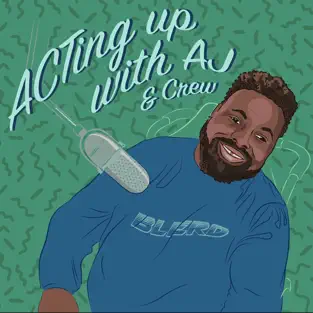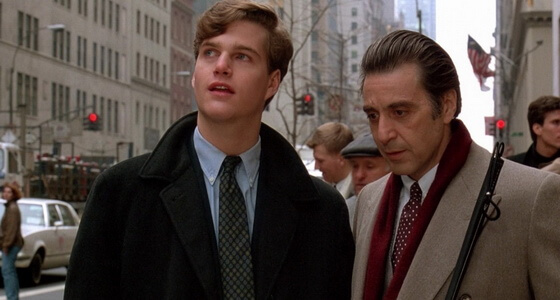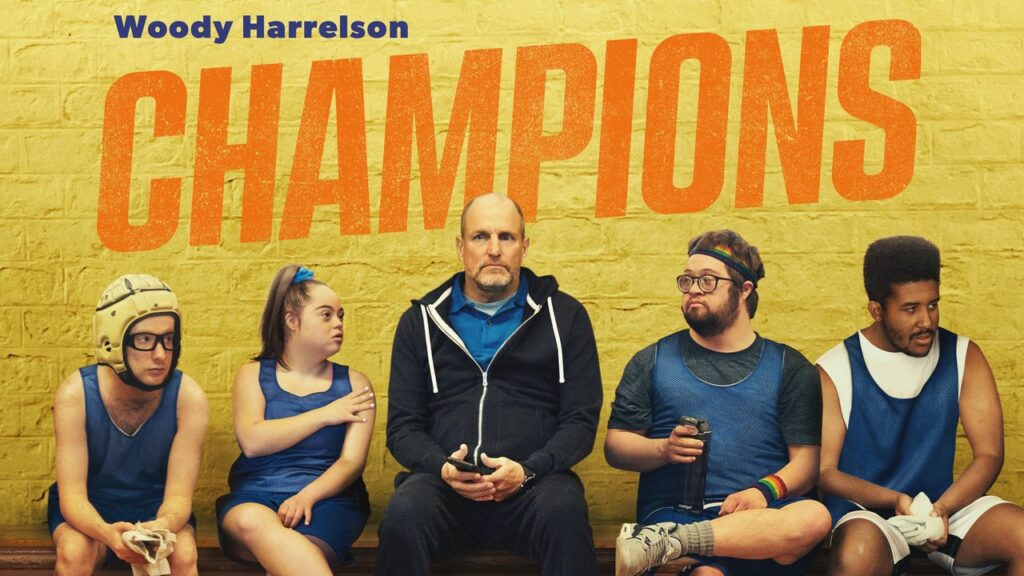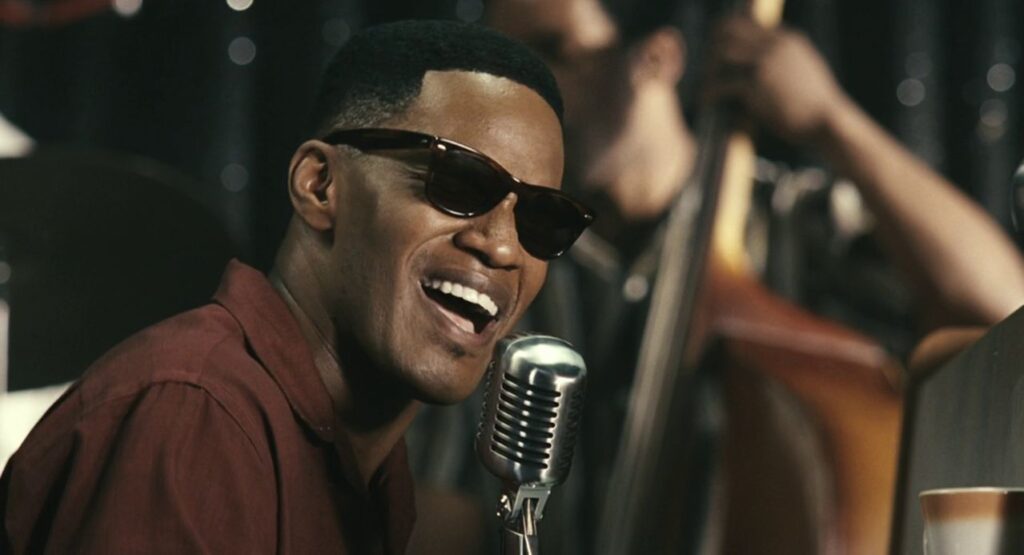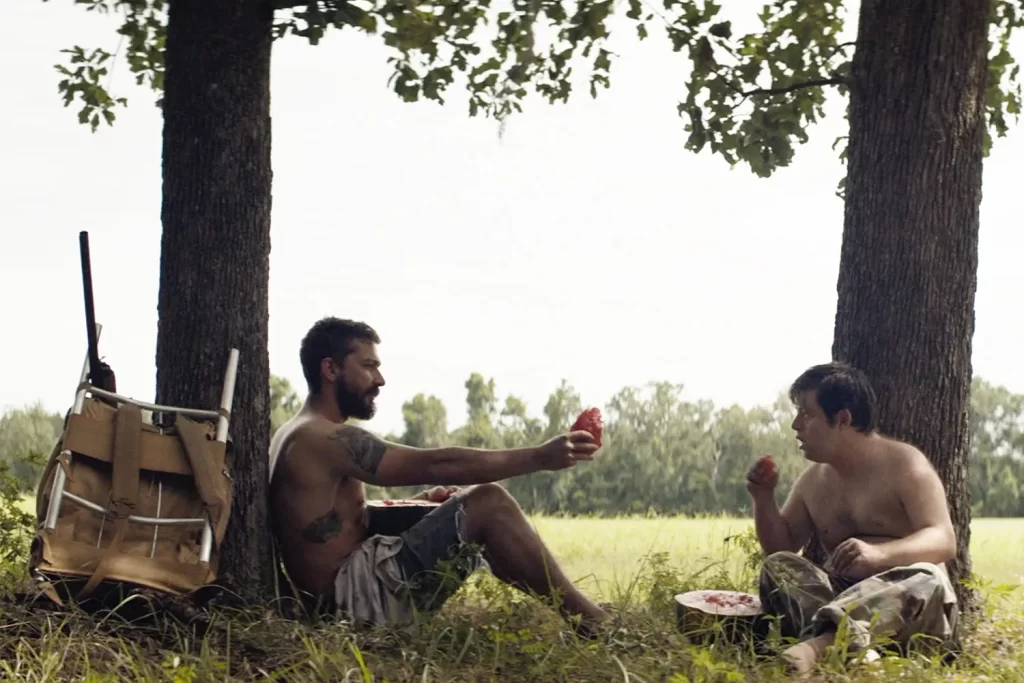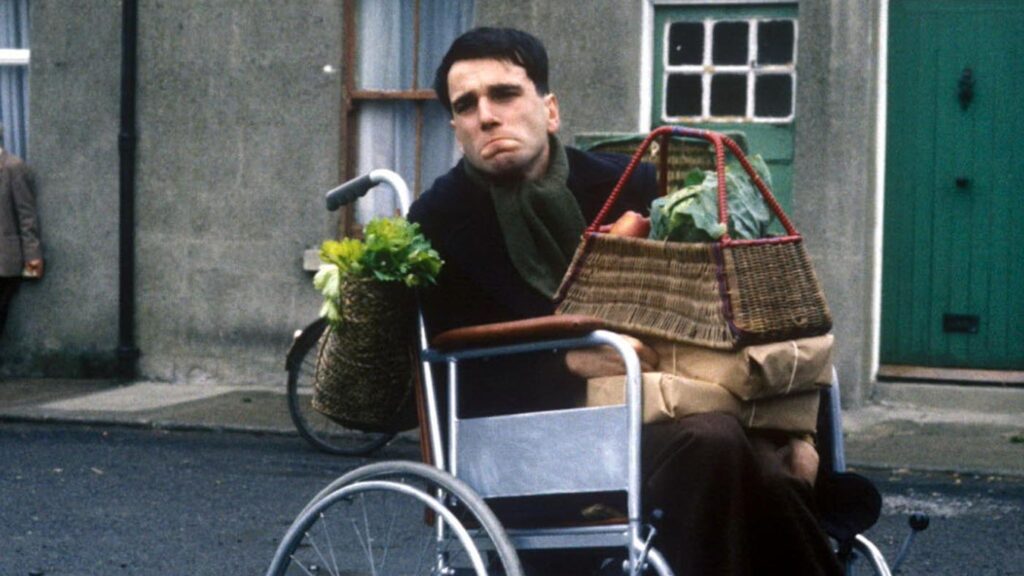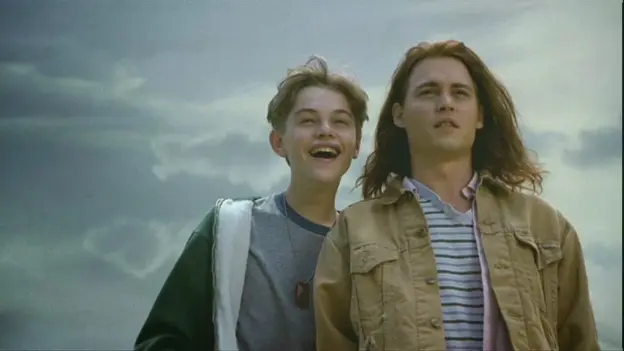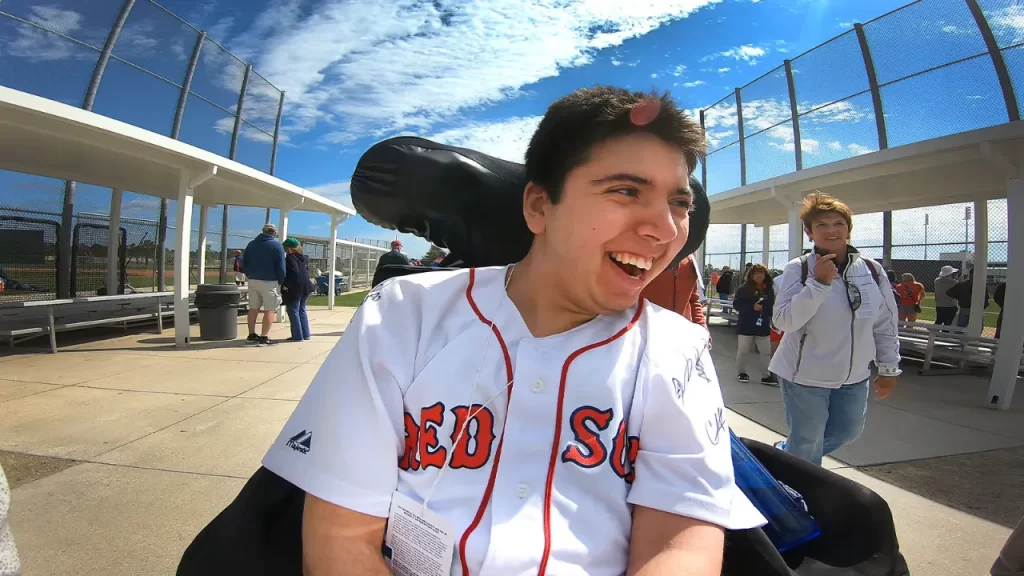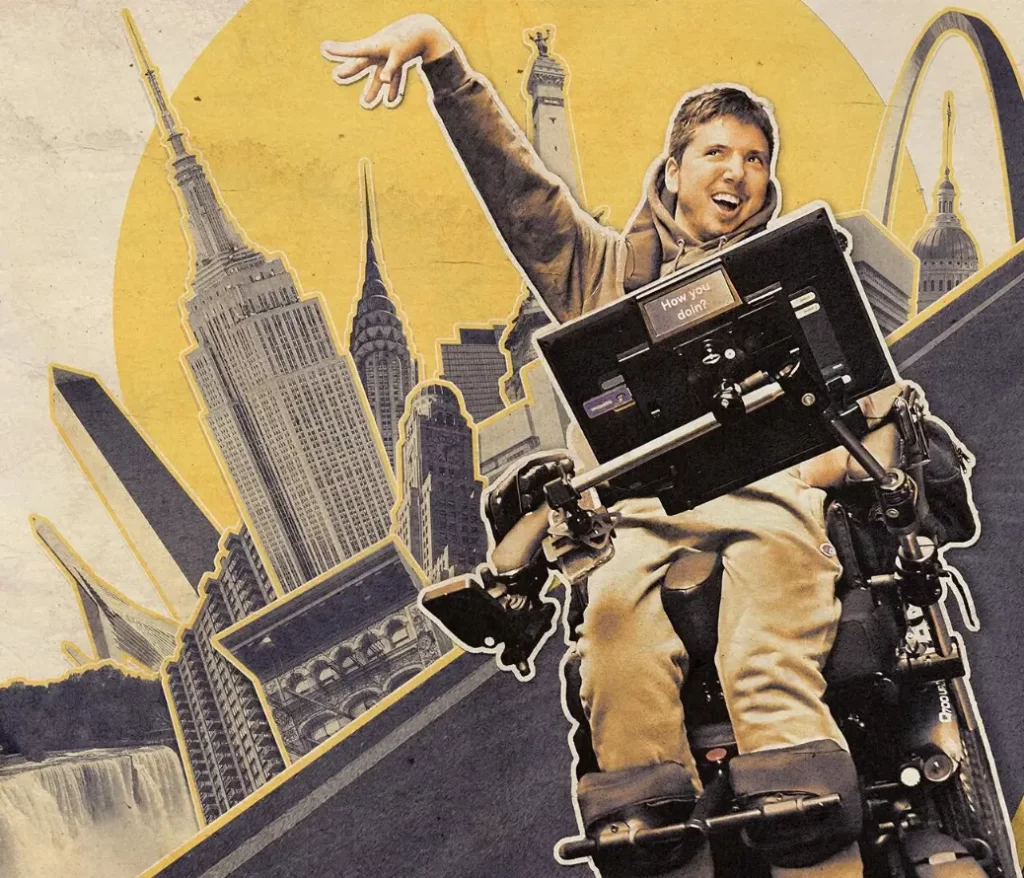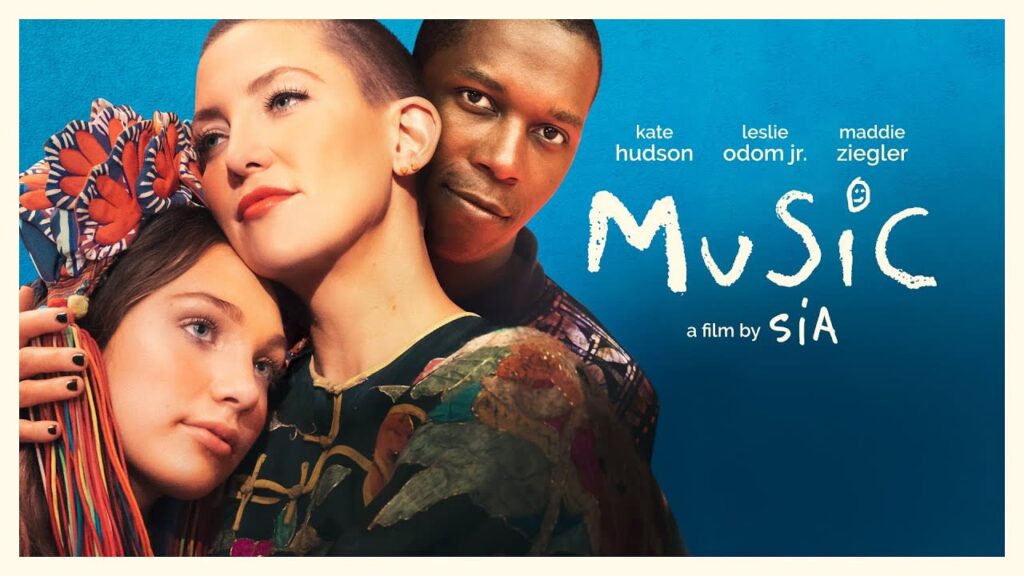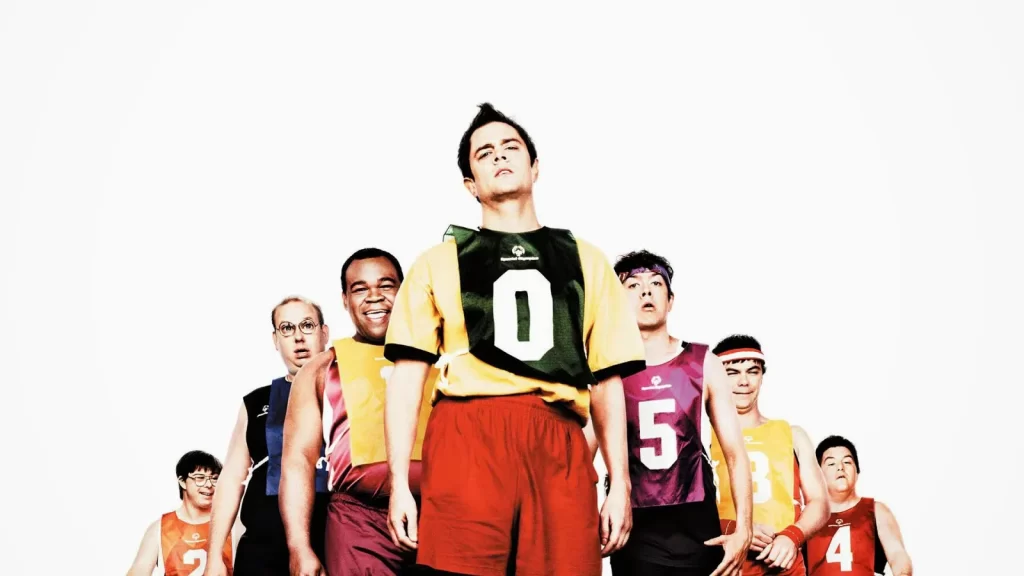On today’s episode of Acting Up with AJ and Crew, we’re talking with our very first guest, Thomas Reid, of Reid My Mind Radio.
And we’re talking about the movie, Scent of a Woman. We’re going to be getting into tropes, stereotypes, guys who yell, guys who yell some more. And is it really a thing to feel someone’s face, to get a sense of who they really are?
Transcript
Intro
AJ: Hey, guys, I just wanted to come in at the very top of the show and give a content
and trigger warning. Today’s film that we discuss on the podcast has themes of PTSD,
that’s post-traumatic stress disorder, and suicide. Listener discretion is advised. If you or
anybody you know are struggling with thoughts of suicide, please call the National
Suicide Prevention Hotline at 988. That’s 988. Please know we care, and you matter.
On today’s episode of Acting Up with AJ and Crew, we’re talking with our very first
guest, Thomas Reid of Reid My Mind Radio! [hoo-ah!] And we’re talking about the
movie Scent of a Woman. We’re gonna be getting into tropes, stereotypes, guys who
yell, guys who yell some more, and is it really a thing to feel someone’s face to get a
sense of who they really are? I don’t know. Let’s get into it with Acting up with AJ and
Crew. [bouncy electronica]
[clips from the movie play with Frank’s dialogue]
FRANK: Yabba dabba doo!
AJ: Why is this movie called Scent of a Woman?
THOMAS: The young kid had to deal with something that he saw.
FRANK: No, I’m just getting warmed up!
AJ: The assumption, the assumption is the trauma is the disability.
SHAWNSY: When was, when would 911 have been called?
FRANK: I’m in the dark!
SHAWNSY: Nearly silent, and he’s doing something, trying not to draw the attention of
the blind man in the room.
FRANK: Hoo-ah!
THOMAS: He’s trying to teach him how to do sighted guide, basically. That’s what that’s
called, right? So, no, I’m gonna grab your elbow. You’re gonna walk normally. This is it.
So, stop touching me. I’m gonna touch you.
FRANK: I know exactly where your body is. What I’m looking for is some indication of
brain. [electronica and the movie clips fade]
Summary and unpacking Scent of a Woman
AJ: Okay, Shawnsy, guys, before we get into it, here’s a quick summary. Frank is a
retired lieutenant colonel who is blind and impossible to get along with. Charlie is a high
school student looking to earn money to go home for Christmas. Now, Frank’s niece
said that this is gonna be an easy job, and Charlie’s expecting it to be easy. However,
what they didn’t count on was for Charlie to be spending his Thanksgiving in New York.
Now let’s get into it, Shawnsy.
SHAWNSY: Yeah, I wonder if we start right off the bat with caretaking for a blind man
and the idea of decency, of how to take care. Like, obviously, Chris O’Donnell’s
character being a young kid showing up at this man’s house, not having any experience
whatsoever, and just gets thrown into this whole weekend that really introduced him to a
lot of concepts that he’d never been introduced in his life before.
AJ: Yeah, and this is just a young man looking for, like, it’s a summer job, basically. And
it’s so funny ‘cause the…. So, he interviews for the job, or he gets the job. And I think
it’s, is it the, it’s his nice, right, or his daughter? And they’re just like, oh, just it’s fine.
Just, you know, sits in a room. Like, he kinda barks, but his bark is worse than his bite
or whatever. And this, that is not what goes down.
[recorded clip]
FRANK: What, are you dying of some wasting disease?
CHARLIE: No. I’m right… I’m right here.
FRANK: I know exactly where your body is. What I’m looking for is some indication of a
brain. Too much football without a helmet? [pours a drink] Ha! Linden’s lying on Jerry
Ford. [sets down bottle] Deputy Debris for Paris. Peace Talks, ‘68. Snagged a silver star
and a silver bar. Threw me into G-2.
CHARLIE: G-2?
FRANK: Intelligence. Of which you have none. [ice clinks as he sips] Where are you
from?!
CHARLIE: Um, Gresham, Oregon. [clip ends]
SHAWNSY: Talk about an intimidating first encounter that he has with this man. Like,
walk into the backyard, going into this house, and just seeing him just telling you off as
soon as you walk in the door.
THOMAS: Yeah. You know, what’s funny is that the niece—I think it was Frank is Al
Pacino’s character—his niece, she’s the one who was looking for someone for him. I
don’t…. I wondered, did he, well, I guess he did. Did he want someone to be his quote-
unquote “caregiver?” Because what was the purpose? Like, I feel like, you know, he
didn’t need, like, he seems to have his ability to navigate. He had made all his plans. He
had his tickets. He made everything that he wanted to do. It felt like to me that it was
sort of a little bit of ableism in there because she wanted it, she didn’t, she just—
SHAWNSY: Right.
THOMAS: Or she just wanted to get rid of him for that little weekend or whatever the
case may be. But I wasn’t sure if it was Frank who wanted the caretaker, whatever we
wanna call it.
SHAWNSY: No, I think it was very much the daughter of being, again, thinking of the
fragility of the disabled that we’ve discussed before on this podcast, on being like, “my
uncle can’t care for himself.”
AJ: Yeah, I definitely had the perception of, like, “This is an old man. He’s blind. And I
just, I’m gonna pay you to watch him, basically, you know, give him some company.” But
it’s more, I definitely got the perception that it was more about her comfort level, you
know? Like, “he needs to be watched, you know. He’s blind, and maybe he can provide
him some company. And in that way, I’ll feel better because I have to go on with my life.”
That’s my perception.
THOMAS: Yeah. And I think that’s one of those, you know, I think we could call that a
trope where someone, a blind person, obviously would need to have all of this help.
That was the whole thing. And no. No. If he was gonna travel to New York on a plane,
he could’ve done it totally by himself, you know, if that’s what he wanted to do. Not to
say there’s anything wrong with if you wanted a companion or whatever the case. But it
seemed like he was—
SHAWNSY: Yeah, didn’t he call the cab when the kid showed up?
THOMAS: Yeah! Yeah, he did everything.
SHAWNSY: And the cab was already there, and he’s like, “We’re going. We’re out.”
THOMAS: Yeah. Yeah. Had his stuff ready. He was ready to go. He had all his plans set
up in New York. Like, he did everything. [delighted laugh]
SHAWNSY: Which was very much on Pacino’s character, too, was clearly infuriated by
the down talking and the belittling that he was getting all the time.
THOMAS: Yeah.
SHAWNSY: Like, the fact that he never wanted to be touched and was only, “I touch
you.”
THOMAS: Yeah, that to me felt a little specific because I think it was…. What I got from
that was that Chris O’Donnell’s character was grabbing his arm or something to help
him navigate, right? And so, that’s something that happens all the time. That part I was
like, oh yeah, that’s real. So, the not wanting to be touched felt more like, “No, I’m going
to hold,” like he’s trying to teach him how to do sighted guide, basically. That’s what
that’s called, right? So, “No, I’m gonna grab your elbow. You’re gonna walk normally.
This is it. So, stop touching me. I’m gonna touch you.” That’s what I got from that. That’s
what that was all about. And I feel similar. [laughs] So, when somebody, you know, if I’m
somewhere, “Oh, let me show you,” and they’ll just grab you. People have done some
really, really silly things. Someone has once gotten behind me and put their hands on
my shoulder and try to turn me to the right and walk me, like, what? Get your freaking
hands off me.
SHAWNSY: [laughs]
AJ: WHAT IN THE WORLD?!
THOMAS: Yeah.
AJ: What the world is…? [laughs]
THOMAS: Yeah, people have done crazy stuff like that all the time. So, and that’s what I
was, that’s where I went. And so, where my, “No, no.” I wouldn’t necessarily say, “Don’t
touch me.” But just, “No, no, wait. Hold on. Come over here. Let me show you how
we’re gonna do this,” you know. Yeah.
SHAWNSY: Yeah, and that’s, we get that even with experienced caretakers on them
assuming what is the right thing to do when really, it’s the person. Like, the person has
final say of their own body and how they wanna be treated and how these, like, how it
should work.
THOMAS: Yeah, I have such an issue with that word “caretaker.” I just don’t like it. But
that’s just me. That’s my personal. I’m not telling you not to use it. I’m just saying. It’s
just a personal thing that gets on my nerves.
SHAWNSY: No, yeah. Sorry about using it. I agree completely. The way that Zeno
operates and the way that we all work, we’re just friends. Like, there is no hierarchy to
this thing. We bring needs to an equal playing field, and then we are all there, and we all
exist together.
AJ: So, there’s so many different names for it. There’s PCA, a personal care assistant.
There’s aide or, you know, and….
THOMAS: I feel like that’s really specific, though. A PCA, like, that’s a relationship that
is, that’s a business relationship, right?
SHAWNSY: Yeah. Right.
THOMAS: ‘Cause that person, at least that’s the way I look at it, I thought that might be
a paid individual or something like that, like you hire that person
AJ: I say, well, I don’t really give it a name, but I, you know, when I am talking about
Zeno, or any one of my friends that assist me with my care, I say, “This is my friend who
facilitates my care,” you know?
THOMAS: Mmhmm.
AJ: And that’s how I say it, you know.
[chill ambient music break]
News Feed
AJ: And now here’s News Wizard and Voice of Reason Cheryl Green with the News
Feed. Cheryl, we have some HUGE international news today. What’s going on? [news
theme music plays through the story]
CHERYL: This story was on The Guardian website on Tuesday, January 9th, 2024. Mar
Galcerán makes history as Spain’s first parliamentarian with Down’s syndrome. “After
being elected to Valencia’s regional assembly, Galcerán says she wants to be seen as a
person, not for her disability.” Here’s the story.
For decades, she battled to ensure that people with intellectual disabilities were part of
the conversation. The extent of the progress she had made, however, was laid bare
recently when Mar Galcerán became Spain’s first parliamentarian with Down’s
syndrome.
“It’s unprecedented,” the 45-year-old told the Guardian. “Society is starting to see that
people with Down’s syndrome have a lot to contribute. But it’s a very long road.”
Her feat has been decades in the making. When Galcerán was 18 years old, she joined
the conservative People’s party (PP) after being attracted to what she described as its
embrace of tradition.
Slowly she worked her way up the party apparatus. Her commitment paid off last May
when she was added as the 20th name on the list of candidates the PP was fielding in
Valencia’s regional elections.
News that Galcerán had obtained a seat in the regional parliament came soon after.
“Welcome Mar,” the region’s PP leader, Carlos Mazón, wrote on social media. “Great
news for politics, overcoming barriers.”
The achievement catapults Galcerán to the top of the ranks of the handful of people
with Down’s syndrome who have crashed through barriers to enter the world of politics.
In 2020, Éléonore Laloux became the first person with the genetic disorder in France to
be elected to public office, as a city council member in the northern town of Arras, while
Ireland’s Fintan Bray was hailed for making history after he was elected to a political
position in the country in 2022.
In Spain, Galcerán’s path into politics was blazed by Ángela Bachiller, who in 2013
became Spain’s first city councilor with Down’s syndrome in the northern city of
Valladolid.
Galcerán may be the first in Europe, however, to join a regional or national parliament,
according to Spain’s Down’s syndrome federation.
“We haven’t heard of anyone else,” said Agustín Matía Amor of Down España. “It’s a
huge step forward and an example of real inclusion.”
He was quick to point out that the achievement was also a reflection of the decades
Galcerán had spent working to advance the status of people with Down’s syndrome in
Spain. For more than 20 years Galcerán had worked as a civil servant in Valencia, most
recently helping to carve out inclusive policy, adding to the four years she spent at the
helm of Asindown, a Valencian organization dedicated to helping families with children
that have Down’s syndrome.
“It’s both great news and a recognition of her work and the many initiatives she was
involved in,” said Matía Amor. “It’s a good example of what is possible.”
And we do wanna note that the first person with down syndrome actually ran in Peru in
2019, and that was 27-year-old Brian Russell. [theme music ends]
[Reid My Mind Radio hip-hop theme music plays]
THOMAS: What’s up everybody. This is Thomas Reid, and you’re listening to Acting Up
with AJ and Crew. Woo woo.
♪ Reid My Mind… Radio…. ♪
Back to discussing Scent of a Woman
AJ: But so, him and Chris O’Donnell, which is like such a surprise ‘cause there’s this kid,
a young man. He’s coming in to this weekend job. Okay, I’ve gotta sit with this colonel.
And the colonel is very domineering, and the colonel’s like, “What are you? Who are
you? And you’re taking me to New York.” You know, it’s like…. And I’m like, what? You
know, but he needs to go, he needs to go to New York. And he’s decided that Chris
O’Donnell is going to be his companion to help him on this trip.
SHAWNSY: Yeah. I’m looking at his dominance, his need for dominance in this on the
topic that we were talking about, about masculinity and the fear of inferiority on what is
this character going through with needing to always be physic-, like, not just physical,
but aggressive in his nature on everything.
THOMAS: Yeah. Yeah.
AJ: He’s still, he— Oh, I didn’t mean to jump over you.
THOMAS: Nah, I was gonna say, I mean, that’s part of that military. What’s interesting is
now that I said that, he said he was a lieutenant in the Army, right? Isn’t that, who isn’t, I
thought that was a Marine thing.
AJ: I thought he was a colonel.
THOMAS: Yeah. No, he’s a lieutenant colonel from the Army. I think he was in the Army,
but I think I always thought he was in the Marines, because that whole “hoo-ah!” I
thought that was something that the Marines do. I didn’t know if that’s an Army thing. I
could be wrong. I was not, I’m not a military dude, but it’s just something that just
occurred to me.
AJ: And I think he said he got it from a Marine consultant that was on set, you know,
and I think he was training Al Pacino.
THOMAS: That doesn’t make sense. That doesn’t make sense if he was in the Army,
though, like. [laughs]
SHAWNSY: It does say he was in the Army.
THOMAS: That’s so funny. That’s so funny.
SHAWNSY: But 1992, I guess, it just, [laughs] writing to write it for this clickbait.
THOMAS: Yeah, yeah.
AJ: Continuity, smontinuity, folks. [laughs]
THOMAS: Maybe, maybe. But I feel like that was the whole, you know, that was that
sort of stereotypical military guy. That was that attitude that he had, right? I think that’s
what that was all about. I don’t, I would hope folks wouldn’t sort of think it’s just, ah, it’s a
blindness thing, which I think we’ve seen in different movies. And I think about shows
from the ‘70s and ‘80s or something where that attitude from a blind person was always
sort of there, right? Like, “Ah, I’m just miserable!” You know what I mean?
SHAWNSY: Like, being the trope of being just because you’re blind, you’re miserable.
THOMAS: Just because you’re blind, right. Everybody would be miserable if they’re
blind. Like, that’s the idea behind it. That’s what it feels like.
AJ: Well, what do you mean, Thomas? I mean, my God, he was in the dark. I mean….
[laughs]
THOMAS: Ugh, in the dark. God.
AJ: [guffaws]
THOMAS: I remember, in the dark, I mean, it really annoys me because I used to do
some work with a advocacy group over here that I helped found. And I remember one of
the times we got a thing done up in the paper, and I think they, it was something like that
in the title was about being in the dark or something like that. And I was like, oh God! It
was terrible. It was terrible. It was just a terrible write-up.
AJ: [laughs a long time]
THOMAS: It had nothing to do with everything we were talking about. So, yeah, I got
beef with that “in the dark” thing.
AJ: [still laughing, then slowly winding the laughter down]
SHAWNSY: Well, he was trying to prove whatever the case was. I don’t even, that
whole ending scene—
THOMAS: Ugh.
SHAWNSY: —was just so out there of just being like, what is even happening? They’re
just putting these kids on for show to discipline them for? And it being a whole prep
school. And then also, of course, in the ‘90s, I looked back on it, I was like, was there
any Black kids in that school? Was that just an entirely just all-white cast [laughing] in
this prep school that was existing?
THOMAS: Yeah.
SHAWNSY: Just like, it had so much ‘90s just written all over it.
THOMAS: Yeah.
AJ: As a matter of fact, I don’t think there was a, I mean, it might’ve been in a
restaurant, but I don’t think there was a single person of color in the movie! And I was
like, this is the ‘90s. But no. Like, you know.
THOMAS: Yeah, that always gets me, especially when you go to New York. Like, you
gon tell me that you don’t see any?
AJ: [laughs]
THOMAS: It’s like Seinfeld. Like, you’re gonna tell me you never ran into Black people
in New York?! Like, really? Yeah.
AJ: Ironically, I don’t wanna go down the rabbit— This will be a rabbit hole.
SHAWNSY: [chuckles]
AJ: But Seinfeld’s friend, best friend is George Wallace. His best friend is Black. But
they didn’t have any Black people on the show. But I don’t know, so. But anyway.
THOMAS: Well, he’s not from New York.
ALL: [laugh]
THOMAS: Yeah.
AJ NARRATING: Hey guys, I’m gonna cut in for a few seconds. The George Wallace
I’m referring to is not the racist governor of Alabama, George Wallace. Rather, I’m
referring to the famous Vegas legend, comedian George Wallace. Now, back to the
show.
AJ: And then like, so, they go on this trip, and he takes them out on a dinner. And he’s
like, “I gotta,” he was like, “I gotta go back to”— ‘Cause he has to go back to school, you
know? And they’re just on this whole excursion. And at least, you know, ‘cause they
didn’t do this, at least he seemed to be disabled and blind who seemed to have, you
know, he saved up his paper because he was able to do this elaborate trip. So, at least
he had some money.
THOMAS: Yeah.
SHAWNSY: Yeah, I was even like, most of the things that I had issues with this movie
weren’t anything to do with the disability that the guy had, but it was just a clearly
abusive relationship. And having this young gentleman get, having to go on this
weekend with a stranger who’s suicidal, who’s militaristic, and a very aggressive
manner, I was extremely, like, red flags were going up everywhere as for being, I work
with children and school systems, so it’s like there are so many red flags that are just
flying out.
THOMAS: Yeah, kidnapping. [laughs]
SHAWNSY: Yes! 100%! The kid was 18, but man, that’s pretty close to being a minor.
THOMAS: Yeah. Was he 18 or 17? I think he might’ve been 17.
SHAWNSY: Was he not quite of age?
THOMAS: Yeah. He might have been 17. Yeah, yeah. You know, it’s funny because that
whole, like, the storyline, I’m not sure if I thought it was, eh, I don’t think it was clever,
but it was…. I don’t know if I think it was corny or if it was clever, but the whole idea that
the young kid had to deal with something that he saw, you know, there was that sort of
that relationship between sight throughout the whole thing, right? So, he had to decide
whether or not he’s going to say what he saw. And now he’s dealing with this man who’s
helping him through whether or not to say anything about what he saw who’s a blind
man. I don’t know. There was a couple of stuff like that. There was that little cliché turn
was that “hear no evil, see no evil” thing that they did. There was a couple of these
other references around sight, and sometimes I’m like, [clicks tongue] nah, I see what
you’re doing. But it’s kinda corny.
SHAWNSY: Yeah, well, there was definitely a bunch of moments that Chris O’Donnell
was like, it was clearly silent, and he’s doing something, trying not to draw the attention
of the blind man in the room.
THOMAS: Mmhmm, mmhmm. Yeah. And he’s always like, “I know where you’re at. I
know you’re there. I know this.” Yeah, yeah.
SHAWNSY: Does that happen? Like, do people, like, as for you being blind, do people
try to sign and try to do things under your nose when you’re right there in the room?
THOMAS: Oh, man. Oh, man. Yeah, 100%. So, you know, you just, [sighs] you just
triggered me, man. [laughs]
SHAWNSY: I’m sorry. These are really serious conversations.
THOMAS: There’s this one time. I’ll never forget this. It was so, oh, it’s just, ugh, it was
an awful day for me. But it was a surprise guest. I’m not gonna go into details. But I
opened, now, this was at my house. So, I opened my door and the surprise guest tried
to sneak underneath my arm when I opened the door.
AJ: [huge belly laughs]
THOMAS: And I’m like, “What the fuck are you doing?” Oh, sorry. I don’t know if I can
curse. But I’m like, “What the heck are you doing?”
AJ: You can curse.
THOMAS: And then they, like, I knew it was happening! How would you not know, right?
And they just thought they did something so clever and so funny. And I was just like, no,
that’s not what you did at all. Like, why would, number one, why would you even wanna
sneak in on me like that? And what makes you think I’m not gonna feel your presence
trying, you know? It was just awful. So, yeah, people definitely do things like that. That
one I know about, but I hear of other stuff when people are, you know, you get stared at
and all that stuff. And most of the time I don’t deal with any of that because I don’t see it
happening, but the people around me do.
SHAWNSY: Right.
THOMAS: So, growing up with two little kids, you know, that’s something that really
impacts them. That impacts your family when you’re being stared at and you’re on
display for other people, so.
PTSD, trauma, and disability in the film
SHAWNSY: Going into the other topic of disability in this film, really on PTSD, on like,
what soldiers go through and not necessarily that this character specifically went
through something in the war. It was an accident that he had, but certainly still, PTSD
was a thing throughout, a theme throughout this film of him dealing with his aggression.
The PTSD with his family that is constantly coming up in the situations, and as well on
mental health.
THOMAS: Yeah, but we don’t know what the cause of that is.
SHAWNSY: Right.
THOMAS: I mean, right? ‘Cause it seems like it was before his so-called accident that
he kind of brought on himself because of his drinking. And then, you know, drinking and
grenades don’t necessarily go together.
ALL: [chuckle]
SHAWNSY: Yeah. Jeez.
THOMAS: So, yeah. So, we don’t know if that’s the PTSD, or is the PTSD just the fact
that he’s blind, you know? Do we automatically think that, oh, just because he’s blind,
there’s gonna be, you know, there’s trauma.
SHAWNSY: Yeah. They really didn’t describe any of that or didn’t really kind of bring
that up. They just, it was just a pertinent thing in his life.
THOMAS: Yeah. And that’s what I mean. I feel like they don’t have to when it’s disability.
It’s just automatically gonna be attributed to the disability anyway.
AJ: The assumption is the trauma is the disability.
THOMAS: Yeah.
AJ: It’s just like automatically built in: disabled trauma, you know? ‘Cause in the movie
he alludes to, I think there was, although like you said, they don’t fill it in, but I think
there was trauma with his family because he says, I think he says, like, “I’m an ass,” or
he alludes to being a horrible person. So, I think it might be a combination of him being
blind, but also really realizing, “I wasn’t a good person.” So, maybe in a way he thinks,
which kind of goes into ableism as well, maybe in a way, I think, “I caused this, so I
deserve this on me.” Or maybe that’s why he wants to take his life.
SHAWNSY: Yeah. Yeah, I definitely saw that aspect of, well, you know, I don’t really
deserve to be. Like, my family doesn’t care for me anymore. I have nobody but this
strange kid that joined me for this weekend. I have nobody left. And so, what is the
purpose?
THOMAS: Yeah, but at least the— Oh, I mean, it’s 1992. There ain’t no spoiler alerts on
this, right? [laughs]
SHAWNSY: No. No, no, no, no. But although that scene, gosh, with him in his uniform
and that whole thing going down was just so absurd to me of getting to that point.
AJ: Yeah. Because it’s just the way he said, like, and kind of nonchalant, too ‘cause I
think they were downstairs. And it was like he was going upstairs, and I think Chris
O’Donnell was gonna go somewhere. And he was like, “I’m gonna kill myself, kid.” And
well, he just said it like [chuckles] it was not a big deal, and that was all kind of his plan,
you know?
THOMAS: Yeah. I don’t know, when they were, that scene you were talking about,
Shawn, when they were, when he has his military uniform on and he ends up pointing
that gun at the kid.
SHAWNSY: The kid. [laughing] Oh, my God.
THOMAS: I was like, yo, you need to leave now! [laughs]
SHAWNSY: Yeah.
THOMAS: I would’ve just been, “Aight, that’s how it is? Go ahead.”
AJ: [laughs]
SHAWNSY: Yeah. It’s like in normal society, in a normal scenario, when would 911 have
been called? The kid had a phone. Like, when is it a time to be like, “This guy just gave
me his death wish. He pretty much stated that, yeah, this is my wish list. And as soon as
I accomplish this, I’m blowing my brains out.”
THOMAS: Yeah, yeah. You know when the time came, when he could’ve done that?
When they were racing that Lamborghini and the cops stopped him. How about that
one?
SHAWNSY: Yeah, yeah!
THOMAS: Racing a Lam— Now, he’s driving that. Look, I’m all for getting out on a place
where, like, the salt mines out in Utah or something like that and just opening up a
Lamborghini.
SHAWNSY: Oh, sure.
THOMAS: Sign me up. I’m there. I’m there for that. But that scene on the street where
he’s— Come on, man, that was New York City.
SHAWNSY: In New York City.
THOMAS: What the hell. There were no other cars around?
AJ: [laughs]
THOMAS: Like, come on.
[clip from the film plays]
CHARLIE: Take it nice and easy. You like this? [gentle music plays, car engine whirs
higher as it picks up speed] Slow down a little. You’re going a little fast. Colonel? Slow it
down. [engine whines]
FRANK: Something’s happening to my foot. [engine whines, music gains energy]
CHARLIE: Colonel, slow down, please!
FRANK: Hold on, Charlie. Let me put it in another gear here.
CHARLIE: Colonel [unclear].
FRANK: Hoo-ah!
CHARLIE: Look out! [tires screech]
FRANK: [cackles]
CHARLIE: You’re gonna get us killed!
FRANK: Don’t blame me, Charlie. I can’t see! [clip ends]
THOMAS: And so, the cop stops them. I feel like Chris O’Donnell’s character would be,
“Hey, by the way, this guy’s blind and wants to kill himself.” [laughs] Okay?
SHAWNSY: “Yeah, you can arrest me now. Take us in so that his daughter can
eventually come back from her weekend vacation and pick us up. Because this is
crazy.”
AJ: Now that I think about it, you know, ‘cause at first, I was trying to analyze, you know,
he’s nervous. He’s a kid. I don’t know what to do. But there were a couple moments he
could’ve got out, but I think it was probably for Hollywood effect, you know.
THOMAS: Oh, most definitely.
SHAWNSY: Yeah.
AJ: I think they had a goal of, I mean, speaking of, which we’ll get into at another time—
THOMAS: What’s the goal? What is the goal of this movie?
SHAWNSY: Right.
AJ: I mean, I guess…. I’m not saying this is what they accomplished, but what I think
they were trying to say is like, this is a dude who has a hard shell and he’s bitter and
nobody wanted to be around him, basically. But because this kid, because this young,
pure kid cared for him and basically was willing— ‘Cause Chris O’Donnell says, “Well, if
you’re gonna die, I’m gonna die too.” And if you notice right after that, they’re kind of
chummy, and he’s even nice to his baby cousins all of a sudden. He wants to give them,
like, he’s nice to them, and he plays with the kids. So, all you need to do to get rid of
your trauma is almost kill yourself, have somebody save you, and be like, you know,
“I’ve seen the…well, I’ve seen the error of my ways.”
SHAWNSY: Yeah, I’m looking at it as from the kid’s perspective of the white man savior
trope that goes into films.
THOMAS: [chuckles] Mmhmm.
SHAWNSY: That this kid had the, like, after saving this adult from killing himself, that he
comes back to reward him and make it so that he doesn’t have to get kicked out of
school. And now everything is perfect and hunky dory for this child. He is now a better
man at the end of this film, even though he certainly is gonna have PTSD himself from
having a gun, a loaded weapon pointed at him. It very much is that white man savior.
That’s what I got out of the film.
THOMAS: Yeah, yeah. I feel like the goal is much simpler than that. I think the goal is
get Al Pacino an Oscar.
SHAWNSY and AJ: [spluttering with laughter]
THOMAS: You know it’s the goal. I think Al Pacino made the call to his agent: [gruff, Al
Pacino voice] “Hey, I want a Oscar!” [laughs]
AJ: Hoo-ah!
THOMAS: “How do I get an Oscar?” [laughs] And so, they made it happen. There you
go.
SHAWNSY: I’m like, I’m looking it up right now ‘cause I wanna see when The Godfather
came out compared to it, and it’s like, was he missing that whole high rise? Was he
wanting something just totally different?
AJ: And oh my God, he had to call on all of his Actor Studio skill because he played
somebody with a disability.
THOMAS: Yeah. Did he win Oscars for other films?
SHAWNSY: He has only won one Oscar for Best Actor, and that was for Scent of a
Woman.
THOMAS: Yeah. Now that’s…. See? There we go. That was the goal.
SHAWNSY: I think you got it spot on, Thomas.
ALL: [laugh]
HOST: [clip from Oscars plays] For Best Performance by an Actor in a Leading Role,
the nominees are Robert Downey Jr. in Chaplin. [applause] Clint Eastwood in
Unforgiven. [applause grows] Al Pacino in Scent of a Woman. [applause grows, cheers
erupt] Stephen Rea in The Crying Game. [applause, cheers] Denzel Washington in
Malcolm X. [applause continue] And the Oscar…the Oscar goes to…. [silence] Al Pacino
in Scent of a Woman. [big cheers and applause as award music plays]
AL PACINO: You broke my streak. [laughter] I thank Bo Goldman who wrote such a
complicated, [pauses for cheering] interesting, funny guy that could be and would be
any actor’s dream part. That part was so great. I think I also wanna thank Tom Pollock
and Casey Silver at Universal Pictures and my agent, Rick Nicita, who urged me to do
this part and actually threatened me if I didn’t do it ‘cause I didn’t wanna do the part for
some reason. [scattered laughter] Ira Lewis, my friend and my colleague who helped
me, Ira Lewis, and the Associated Blind, for their generous support to me. [Oscars clip
ends]
[chill music plays]
Content Roundup
AJ: Cheryl’s back in the house with your Content Roundup. Hey, Cheryl.
CHERYL: All sorts of activists, both d/Deaf and non-deaf, have been talking a lot on
social media about the ASL Barbie, and here’s a great story from USA Today: Deaf 3-
year-old girl’s adorable reaction to watching Barbie with ASL is going viral. Here’s the
story.
A video of a “profoundly deaf” toddler encountering the magic of Barbie with ASL is
going viral.
Thanks to American Sign Language interpreter Leila Hanaumi and the film’s resolve to
take more steps towards inclusivity, those too young to read, like 3-year-old Riley of
Virginia, or those with disabilities hindering them from reading, have been brought into
the Barbie experience.
The ASL version of the film, released on Max Dec. 15, offers a unique viewing
opportunity for the Deaf community to enjoy with family and friends, Warner Bros. said
in a statement.
But most of us don’t realize how significant it actually is.
Captions, while helpful, aren’t fully inclusive. “[ASL] is not just English on your hands,”
Riley’s mother, Christina, told USA Today Wednesday. “It’s a different language.”
3-year-old Riley experiences Barbie with ASL.
When Christina saw Barbie being released with an ASL interpreter on screen, she knew
she couldn’t pass up the opportunity for her daughter to experience it. Though she was
hesitant because of the film’s rating, they gave it a go.
Since Riley is a fan of the song Pink by Lizzo, Christina thought they’d at least watch
that part together, but then she saw the way her daughter lit up as she watched the
interpreter and decided to let the film roll on.
AUDIO DESCRIPTION BY CHERYL: Embedded in the middle of the article is a TikTok
of Riley, the three-year-old watching Barbie ASL. She’s got a cochlear implant, and the
TikTok itself shows her signing along and then an inset of the interpreter signing on
screen. She’s a white child with long blonde hair pulled back in a ponytail with a
headband and some barrettes, and she’s bouncing and swaying on the sofa as she
sings and signs along.
ARTICLE: “I was curious to see how much Riley would look at the interpreter, so the first
time we watched, I watched Riley's eyes closely to see where they went,” Christina said.
At Riley's age, adding captions to a film won’t work. An ASL interpreter is the way she
can watch a movie.
“Even as Riley grows up and is able to read, having an ASL interpreter on screen
means Riley is able to view the movie in her preferred language,” Christina shared.
Riley wears cochlear implants that give her access to sound, but sign language is the
only language fully accessible to Riley. Since ASL is Riley’s first language, her family
began learning it when Riley was just a few months old.
“Now, it’s part of our daily lives,” Christina said.
The messages that stuck.
Not only was Riley engaged while watching Barbie with ASL, she started picking up new
signs from the interpreter, Christina said and was singing along.
Not only was Riley engaged while watching Barbie with ASL, she started picking up new
signs from the interpreter, Christina said, and was singing along “almost immediately.”
There is one line from the movie that Riley often quotes. It’s the scene where Margo
Robbie (Barbie) is sitting at the bus stop alongside Ann Roth (The Woman on theBench),
Barbie tells the woman, “You’re so beautiful,” and Riley always responds, “I
know it!” with Ann Roth.
“It’s really special to see, and such a great message for Riley and all women and girls,”
Christina said.
There is no better feeling, Christina said. The movie is fully accessible for Riley, just as it
is for her peers.
The brand’s slogan “Barbie is for everyone,” seems to ring true here, Christina shared.
“Barbie certainly is for Riley and her Deaf community.”
CHERYL: People did an article on December 26th, 2023, Who Is the Sign Language
Performer in Barbie’s ASL Version? All About Leila Hanaumi.
This Barbie is making a more accessible movie-watching experience.
Along with the Dec. 15 Max streaming release of Greta Gerwig’s hit Barbie came a
viewing option for deaf and hard of hearing communities. And the breakout star of
Barbie with ASL, sign language performer Leila Hanaumi, counts producer-star Margot
Robbie among her fans.
“People keep asking me how did I prepare for my role, but I only played one role. You
just played a whole film,” Robbie, 33, said to Hanaumi in a Barbie with ASL post-
screening Q&A held Dec. 14, according to The Hollywood Reporter.
“It’s just a brilliant piece of acting,” raved Robbie, producer and star of the film.
Hanaumi, a mother of two based in Austin, Texas, is a communications manager for a
deaf-owned marketing firm. She's gone viral for her ASL interpretations of pop songs,
including an official collaboration with Tove Lo.
On her social media, Hanaumi describes herself as a “Deaf Creator, Performer, Writer,
& Mompreneur.”
In an interview via interpreter with Austin affiliate KXAN, Hanaumi said she was raised
by two deaf parents. As a child, her mother would sign movies for her to enhance her
viewing experience.
“Ninety percent of deaf children are born to hearing parents and the vast majority of
them don’t ever have access to sign language,” said Hanaumi. “So that leads to
language deprivation from that child, it’s a huge issue in the deaf community.”
That’s why she signed on to be the interpreter for Barbie with ASL, the first Warner
Bros. movie to feature it as a language option, according to The Hollywood Reporter.
After watching Gerwig’s film 50 times and working with ASL coach JAC Cook, Hanaumi
filmed for three days in front of a green screen. As the film’s only interpreter, she
focused on delineating between characters by “role-shifting,” she told the outlet.
“Even though I am able to understand movies with English captioning, there are still
some things missing: tone, the meaning of certain complex lines. It’s never going to be
fully accessible for me as a deaf person.”
“My hope is that the Barbie movie will set an example and a standard of what
accessibility and inclusive experience looks like not just for deaf children, but for adults
as well for the community at large,” she continued.
As for which scene in Barbie was her favorite to interpret and perform, Hanaumi told
The Skimm that America Ferrera’s “epic monologue” about expectations for women
resonated with her.
“It exposed what it’s like being a woman living under patriarchy in such a real way. I saw
so much of myself in her monologue that it permanently altered my worldview.”
Barbie, now streaming on Max, has become 2023’s biggest box office hit. Back in July
when the movie first appeared in theaters, Robbie showed off her sign language skills
on a red carpet for a fan.
AJ: Thanks, Cheryl. Let’s get back to it. It’s Acting Up with AJ and Crew! Scent of a
Woman is available on Amazon Prime Video for rent. Closed captioning and audio
description are available. [chill music fades out]
Portraying disability on screen
SHAWNSY: Yeah. So, that goes into the question, too, at the end of all our discussions
of could a disabled, a blind man have played this role?
AJ: Well, I think that a blind man could’ve played the role. And I think that if a blind man
actually played the role authentically, he would’ve not won the Oscar.
THOMAS: Yeah. It would be a whole different thing there. It would be too real if a blind
man played the role.
AJ: Exactly.
THOMAS: Yeah.
AJ: Exactly.
THOMAS: Yeah.
SHAWNSY: Yeah, we’ve spoken on the Academy Oscar bait that these films make. And
it seemed like this film was specifically made for Al Pacino, or Al Pacino picked it so that
he could get that Oscar.
THOMAS: Yeah, ‘cause, but…. ‘Cause his acting was not up to par there. Come on.
That “in the dark” scene is terrible. [chuckling, then screams] “I’m in the dark!!!” Like, it
was so stupid!
AJ: I’m telling you, people, for good or bad. And people, I think they look at it as, they
look at it as transcendent acting because you’re so far out of yourself. Because, you
know, I’m not saying that that was true, but a lot of people are gonna look at the surface
and say, “Well, because you played a blind man, that was praise to the acting, it allowed
you to call on all of your acting skills.” Where I think if it wasn’t about him being blind
and so far away from himself being able-bodied, I don’t think…. You know what? I don’t
know if I’m explaining it right.
THOMAS: Yeah, I know what you’re trying, I know what you’re saying, but it still doesn’t
make sense, right? Because, so, for an on-screen actor who’s playing someone who’s
blind, what are they actually doing that…. [big sigh] So, they still have eyes in their head.
We just don’t, we just know this character is blind because they’re telling us that he’s
blind, right? Now there’s movements and other stuff that’s going on and knowing how to
use your cane and using your cane properly. And there’s other things, obviously, that’s
involved in it, but from the onscreen perspective, it’s just a matter of the fact that they
tell us this character’s blind. Like, I don’t see where the…. I don’t see what— Well, I
guess there’s the emotional side? I don’t know. I’m just, again, I’m not a actor, but I don’t
know what the heck it is that they’re supposed to be bringing out and that we’re
supposed to really sort of recognize as quote-unquote “blindness.” What is it?
AJ: Thomas, being blind and dealing with being blind and almost wanting to kill yourself
and not killing yourself is so triumphant!
THOMAS: [chuckles]
AJ: You don’t get it? Like, he overcame.
THOMAS: [laughs] Ah! He’s overcoming his blindness!
AJ: Not only did he overcome, he overcame—
SHAWNSY: [laughs]
AJ: He overcame his blindness. He saw his worth. And like, “I’m blind, but it’s okay. I
don’t wanna kill myself. I can live another day. I can sit in my chair, and I can say, ‘hoo-
ah’!”
THOMAS: Hoo-ah. Even though he was in the Army, not the Marines.
SHAWNSY: Yeah. So, that brings up the question, like, if this script was brought up in
today’s world, I think you could potentially put an actual blind man in there, but the script
would need to be changed almost entirely, on maybe it would be a recent blindness.
Like, it wouldn’t be a just like long-time veteran, or it is just dealing with newly, being
newly blind. Or you could, there’s so much to the script that needs to change. 1992, like,
I don’t…. [laughs] I look at some of these movies that won these Oscars in the ‘90s, and
I’m just like, uh, not movies I really care to watch today. They don’t really have the same
impact. They don’t really hold up anymore.
THOMAS: Yeah, that’s you. But do you think the general public would feel the same
way? Because I feel like they could still get away with something like this today.
AJ: Exactly. I think so.
SHAWNSY: Yeah.
AJ: I think so. Unfortunately that’s true. I think we would make a lot of noise today
because of social media in terms of maybe the unauthentic casting or the same “I’m so
sad because I’m blind” storyline. I think we would have something to say over social
media, but I think the studio would still finance it.
THOMAS: Yeah.
AJ: Because it’s, unfortunately, it’s 32 years later, but it’s still very much Oscar bait.
THOMAS: Yeah. I think they would change a couple of things, you know, to make it not
as bad because there is a difference in terms of how we look at things today. But I don’t
think it’s that different. I think there’s, you know, they’re gonna put a little bit of lipstick on
the pig, you know what I’m saying. [laughs]
AJ: Yeah, yeah.
THOMAS: Or whatever that phrase is. But hopefully they don’t. But if they do, I mean,
would, so, could a blind— Yeah, a blind person could definitely play this role. I think one
of the things they usually sort of put forward as a reason a blind person, or a disabled
person in general, can’t play a role for a person with a disability, is that they once were
not, right? In this particular case, there were never any scenes where Al Pacino’s
character was not blind, so he was always blind.
SHAWNSY: Right. Yeah, we had this conversation with Forrest Gump about Lieutenant
Dan because he has the scene where he is in the military and still has his legs before
he loses them.
THOMAS: Yeah.
SHAWNSY: And we still had the discussion with the amount of visual effects that
existed to make him not have legs compared to doing something, giving an amputee
like two minutes with legs, using visual effects for that purpose, that it could’ve been an
offset. I don’t think it’s [inaudible].
THOMAS: Yep.
AJ: I think it would be in the reverse, but that’s for us. I don’t think, well, maybe this is
too low to say, but I don’t think any studio would be like, “Well, we would love to cast
him, but we can’t because in the beginning he can walk, this brave actor. He’s a good
actor. He killed it in the audition, but he can’t walk! Oh, my God, we can’t cast him.”
THOMAS: Yeah, that would be the excuse, but you’re right. I mean, the reality says that
CGI and all of that. I mean, they made Christopher Reeves walk in that commercial all
those years ago, you know?
AJ: Yeah, right.
THOMAS: The technology is definitely there, but do they wanna do that? No, but maybe
that would be, they could win a different award. They could probably win a different
Oscar for CGI with that.
THOMAS and AJ: [laugh]
SHAWNSY: It would be great to see, to see that flip.
THOMAS: That would, that would. And depending on the actor, you know, yeah, there’s
all sorts, with if it was a blind person, and let’s say, their eyes represent, you know,
maybe their cataracted over or something like that. I mean, they could have contacts
and all that stuff. So, they could, you’re absolutely right, they could flip it and do it the
other way if they really wanted to.
AJ: They could flip the script?
THOMAS: Yeah, flip the script. I think the other thing, though, is, the other excuse is the
marketability of the name, right? So, that’s Al Pacino.
AJ: That’s a big one.
THOMAS: And so, people wanna go see Al Pacino. People don’t necessarily wanna go
see Thomas Reid, right? If I was the actor in there, they don’t know me.
SHAWNSY: Yeah. Yeah, we looked at the box office. So, the budget of it being $34
million, the box office was $134. So, it’s like you can really see the draw of Al Pacino, sill
in his prime.
THOMAS: Yeah, ‘cause it sure wasn’t the movie.
THOMAS and AJ: [laugh]
THOMAS: How many of those people actually saw it twice? I don’t know. I don’t think
so.
AJ: [laughs] And maybe it’s just me. Maybe it’s just me, but as we go through the story,
and I know that he dances with a woman, and he kind of flirts on the plane with the
stewardess. But why is this movie called Scent of a Woman?
THOMAS: Oh! ‘Cause you didn’t notice how great his—that was the other thing—how
he knew all of these perfumes. Every time a woman came into, he would name that
perfume. He named, I think he named like three different perfumes throughout this
movie. I was like, geez, were you in the Army, or did you work at Sephora or
something? [laughs]
AJ: [laughs] Yeah! Yeah, that’s what I’m saying! Like, you may know the, I’m like, I know
the scent thing, but I don’t know the names, you know? I don’t know. But, you know,
[chuckles] he’s blind, and so he’s just sitting at home.
THOMAS: Yeah, so just going through different scents, right?
SHAWNSY: This is also another discussion that we’ve constantly had over multiple
films, is the supercrip idea of, yeah, we were talking earlier with Ray being able to all of
a sudden walk down the curb really easily without having an issue. And Scent of a
Woman, all of a sudden, I guess he has this incredible sense of smell and can just
identify perfumes.
THOMAS: Yeah. It’s ridiculous.
AJ: I don’t know, Tom, because I know for me, it’s no. I have a big nose, but do you
have a keen sense of smell?
THOMAS: Yes. You need to take a shower. [laughs and laughs and laughs]
SHAWNSY: He can smell you from the Zoom chat too.
AJ: I mean, I mean, that, I mean, that is true. That is very true. I didn’t know. You weren’t
around last night. You didn’t tell me.
THOMAS: And you’re right. It works through Zoom. Nah, I mean, it’s the same. It’s the
same thing, man. It’s that whole idea that once you lose one sense, everything else
goes extremely high. And it’s not true. You know, you just have to use your senses more
often. I don’t have a problem with him, like, if he were like, “Oh, that’s a….” [sniff, sniff]
“Hmm. I smell a floral arrangement” or something, you know what I’m saying?
SHAWNSY: Right, lavender.
THOMAS: Yeah, lavender. Right. Something specific.
SHAWNSY: I can smell citrus. Uh-huh.
THOMAS: But this idea that he can name the brand? Come on, dawg.
SHAWNSY: Well, like, if it was rewritten that he was a perfume salesman before he
went blind, then that makes sense.
THOMAS: Yeah.
AJ: I just don’t know. So, the reason why I said it is because when I was a kid, I didn’t
really see the movie. I think I remember seeing it on in the background. But I thought
the movie Scent of a Woman was a romantic comedy. And as I’m looking at the movie,
doing the research for the podcast, I’m like, I don’t really, you know, I know what he
says about smelling the perfumes, but it’s such a, [laughs] it’s such a small thing. And
the movie is about him and Chris O’Donnell.
THOMAS: Yeah.
AJ: And this, you know, them coming together in this strained relationship, or in this
one-sided relationship. So, I don’t know why it’s called Scent of a Woman, you know?
THOMAS: It’s also taken from a book, I think, an Italian book. So, it could be something
more than that. Maybe that was the translation, the literal translation or something, I
don’t know. But I think the character was based on someone from some book.
AJ: I mean, I would’ve bought it more if the movie was called Hoo-ah! you know? But it’s
not.
THOMAS: No, they would’ve been wrong then too, apparently. [chuckles]
AJ: [laughs] So, but—
THOMAS: Can we throw one other thing in here? Because one thing we didn’t talk
about with Scent of a Woman. [laughs] And you don’t have to throw it in, but it was the
trope that they ended up including. And I thought we were getting out of the film without
it, but they did the face feel thing. They had Al Pacino pull down Chris O’Donnell’s
character, whatever the hell his name was, and feel his face. Do y’all remember seeing
that?
AJ: I think I do now ‘cause it was at the very end of the film.
THOMAS: Yeah, he felt his face, man. He felt his face.
AJ: So, it’s kind of like, you’re a good chap, son. Like, I’m gonna, I’m gonna….
SHAWNSY: I’m gonna touch you.
THOMAS: I wanna know what you look like, so I’m gonna rub my hands on your face.
AJ: So, but I don’t know, Thomas. So, I’m partially blind, so would it help me to partially
feel somebody’s face? Or would that help?
THOMAS: It depends on the person. And it might not be a face that you need to be
feeling. [laughs] So, I’m just saying.
AJ: [laughs]
THOMAS: So, you can use the line. I’m not mad at anyone who wants to use the line to
get what they trying to get. You know, everybody got their own game. Go ahead and
play yours. But it’s not a cool thing. It’s a corny trope. It’s old. And I thought we could
just leave that with Lionel Richie and Hello.
AJ: Like, leave it to Lionel Richie.
THOMAS: Yeah, let’s keep it back there.
AJ: And he can say hello and….
SHAWNSY: [laughs]
AJ: Now that you say that, I just got a bunch of scenes playing in my mind, ‘cause
there’s a bunch of scenes that I’ve seen in shows and film where blind people are
feeling faces.
THOMAS: Oh, dude, yeah. All the time.
AJ: There’s even, not to go too much down a rabbit hole, but there’s even an episode of
Frasier where James Earl Jones plays a blind man, and he has a sculpture of his wife’s
face, you know. And he feels that—the wife is dead now—but he feels that sculpture,
and it’s like, “that reminds me of my wife.” Frasier admires the sculpture and breaks it.
THOMAS: [chuckles]
AJ: So, they have to put it back together, but that just reminded me of, I’ve seen that a
lot, so.
THOMAS: Yeah, well, they need to break that trope. [laughs]
SHAWNSY: Well, yeah, Thomas, how many faces have you felt?
THOMAS: I have never felt the face in my life. [laughs] In my blind life, I have not felt a
face. [chill music]
Disability Spotlight
AJ: And now here’s Shawnsy with Disability Spotlight.
SHAWNSY: This episode’s spotlight is for none other than our guest, Thomas Reid,
audio producer, voiceover talent, audio description narrator, consultant, and advocate.
Thomas Reid is the host and producer of Reid My Mind Radio, a podcast featuring
compelling people impacted by all degrees of blindness and disability. Through his
annual season Flipping the Script on Audio Description, Reid explores the art and
examines its implications on the community. A member of the Social Audio Description
Collective and a freelance audio description narrator, Thomas has appeared on projects
for Netflix, HBO Max, Hulu, PBS, and more. He provides consultations for independent
filmmakers, film festivals, co-facilitates workshops, and serves as moderator or panelist
for discussions on audio description and content accessibility. Now, if you too want to
learn more about blindness and other disabilities, check out ReidMyMind.com. That’s
Reid r-e-i-d my mind dot com. And in fact, just this past Tuesday, January 23rd, 2024,
he has started up his new season, his 10th season. You can find him anywhere
podcasts are found and tune in on every second and fourth Tuesday of the month.
Thank you, Thomas, for being part of the crew.
[Reid My Mind Radio outro plays] Reid my mind. Reid my mind. [record scratch]
Radio….
Wrap-up
[epic news music]
AJ: We hope you enjoyed today’s episode. We really enjoyed making it for you. So, for
Shawnsy Billops, Cheryl Green, and myself, Ajani AJ Murray, come and join the crew
next time on Acting Up with AJ and Crew. Our next episode we’re talking about the
movie, Ray. Special thanks to Jessica Marks for behind-the-scenes assistance.
Transcript by Cheryl Green.
